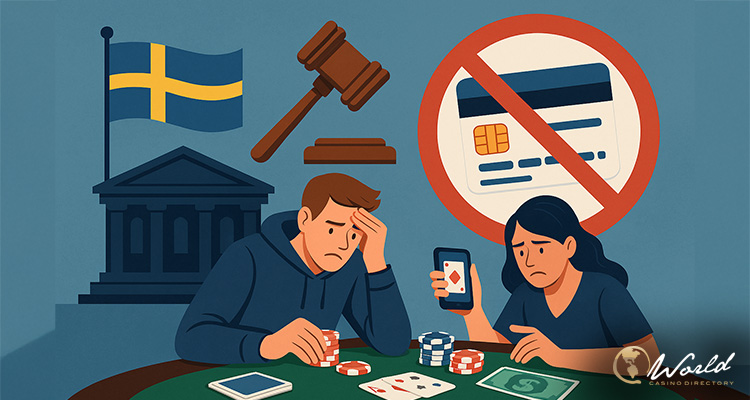Sweden is preparing to introduce a far-reaching ban on gambling with credit in a move aimed at protecting consumers and promoting a more sustainable gaming environment. Under the newly proposed legislation, gambling operators and agents licensed in Sweden would be strictly prohibited from accepting any bets financed with borrowed money, whether through credit cards or third-party credit providers.
Expanding the scope of existing restrictions:
The proposed changes build on the current Gambling Act, which already restricts certain credit-based transactions but has, according to the government, left significant gaps that enable players to gamble with credit from sources outside the scope of regulated operators.
As it stands, Swedish law limits the use of credit in gambling only when credit is issued directly by licensed operators or gambling agents. This narrow scope, critics say, allows players to circumvent the ban by relying on other types of credit agreements or tools. Finance Minister Niklas Wykman emphasized the intent behind the expanded proposal at a recent press conference, stating simply: “You simply should not bet with borrowed money.”
The legislation, set to be reviewed by the legislative council, would replace the current limitations with broader regulations that hold licensees and their agents accountable for any instance where gambling is funded by credit. The proposal outlines several key restrictions intended to reinforce the credit gambling ban. Operators would no longer be allowed to direct or connect players to third-party credit providers, effectively eliminating indirect access to credit for gambling purposes. They would also be prohibited from accepting any bets if they are aware that the player is financing their gambling through borrowed funds. Additionally, both land-based and online gambling platforms would be barred from processing credit card payments when it is identifiable at the time of the transaction that a credit card is being used.
The government underscored that these measures aim to curb over-indebtedness and help shield vulnerable consumers from financial harm.
Implementation measures and potential exemptions:
To comply with the new rules, gambling operators will be expected to take visible, practical steps to discourage credit-based gambling. These measures may include placing warning signs in physical locations or implementing clear, on-screen notifications online. Importantly, the government clarified that these actions should be simple and cost-effective, utilizing existing technologies already in place to prevent credit card transactions without hindering other sales.
According to the Ministry of Finance (Regeringskansliet), though the restrictions will be comprehensive, some room for exemptions remains. The legislative council suggests that specific lotteries, especially those serving public interest and non-political causes, could be permitted to continue offering limited credit-based products. These exceptions would be administered by the Swedish Gambling Authority (Spelinspektionen), provided strict conditions are met to minimize financial risk.
For instance, subscription-based lotteries and certain supplementary games might qualify for exemptions if safeguards are implemented to cap credit usage.
The new proposal follows increasing pressure from Spelinspektionen and consumer protection advocates. The regulator has previously pushed for tighter controls, particularly around the use of credit cards, and voiced concern that current definitions of “credit” lack clarity. While Spelinspektionen has not yet issued a formal stance on the latest draft, the authority acknowledged the proposed changes and is expected to weigh in as discussions progress.
This legislative push is part of a broader crackdown on harmful gambling practices. In recent months, Spelinspektionen has issued a string of enforcement actions, including bans on several unlicensed online operators and warnings to influencers promoting gambling without a Swedish license, especially on platforms like Twitch.
If passed, the revised regulations will take effect on April 1, 2026. By then, all licensed operators will need to have fully implemented the necessary systems and policies to ensure no gambling activities are funded with credit. The move represents one of the most comprehensive efforts in Europe to disentangle gambling from debt and reinforces Sweden’s ongoing commitment to consumer safety within its regulated market.
(Except for the headline, this story has not been edited by PostX News and is published from a syndicated feed.)

